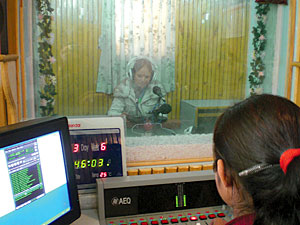 |
In the 14 years since Radio Sagarmatha became the first FM station to get a broadcasting license, Nepal's radio revolution has survived regime change, crackdowns in newsrooms, and crippling power cuts.
The quality of the content may not match the quantitative growth of radio from Jumla to Taplejung, but the stations have been serving people so far left out of the informationsphere. Travelling across Nepal today, one of the most noticeable things apart from new roads are the new transmission towers. Even in the remotest of places, there are FM stations playing songs in local dialects, running adult literacy classes and SLC tuitions on air.
These radios achieve a rare goal in a country where half the people are still illiterate: they keep the people informed, engage them in the information production process and help in development and rural empowerment.
Four months back while travelling through Darchula in far-western Nepal, I met an enterprising farmer, Hari Singh Mal. After hearing horticulturist Kedar Budhathoki talk about a wilt-resistant variety of tomatoes, Hari Singh introduced tough tomatoes known as Srijana in his farm. The breed developed by scientist Budhathoki yielded him 10 kg of tomatoes from a single plant.
Since Nepal Telecom extended its service to Gokule, Hari Singh is now a mobile user and listens to Saugat FM, broadcast from neighbouring Baitadi in his new handset. BBC Nepali and the Ujyalo FM network are now the most popular programs being syndicated by local stations. Programs on current affairs, national politics, economy and agriculture reach people all over the country via these channels.
Numerous FMs are run solely by women (see overleaf), a phenomenon that is yet to happen in print or TV. There are now all-women community radios in Parbat, Udaypur, Morang and many other places. Bringing in women, farmers, students and the rural community into its programming and production, community radio comes closest to being a democratic media in Nepal today. It empowers citizens with information, and spreads awarensss about rights and development.
Now radio is on the cusp of a new revolution: extending its reach through the internet. "Radio are no more restricted to the range of the signal from the transmitter, we can now broadcast worldwide through the net," explains Gopal Guragain of Ujyalo FM which recently made the switch to digital first streaming audio through the net.
Ujyalo is now being heard by Nepalis in 105 countries and gets regular feedback from Saudi Arabia, US and UK, with 5,000 hits daily. This has led to a more diaspora-focused programming and allowed global Nepalis to connect to the concerns of their communities back home. A Jhapali living in the US can now directly listen to a local FM from Damak. People can go back to programs in the archives, listen, comment and view the content in a multimedia format.
Many people today hardly remember the struggle and years of lobbying that have gone in freeing frequency modulation for private broadcasters. Today, community radios in Nepal are grappling with coming-of-age problems like political control, commercialism, centralised syndicated content, and erosion in quality of programming.
The challenge is to preserve the participatory and grassroots nature of the medium, ensure sustainability and find ways to improve quality amidst rising commercial pressures.
Read also:
Sajha Sawal is 200
BBC Nepali's popular radio discussion program hits a second century
Karnali community, HARIDEVI ROKAYA in JUMLA



